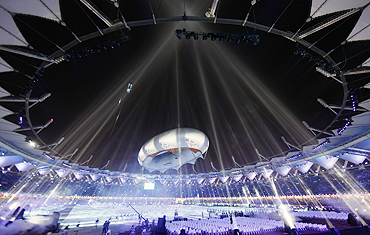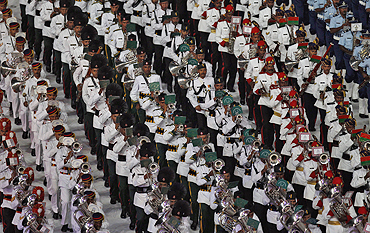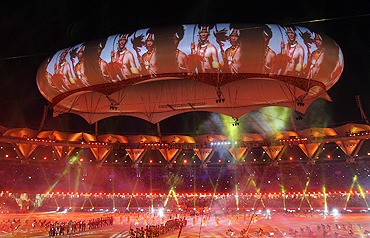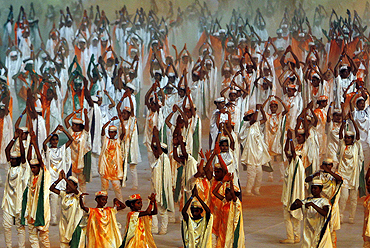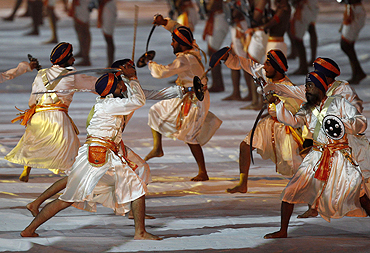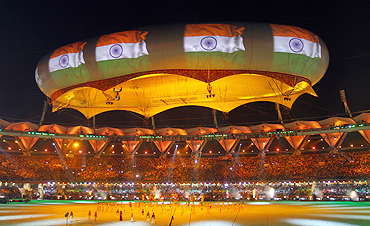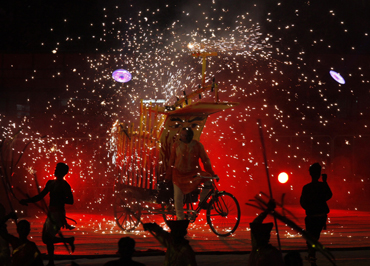 | « Back to article | Print this article |
Spectacular ceremony draws curtains on successful Games
Over 2,700 shots of fireworks, 25 stacks of speakers producing 500,000 watts of sound and 1,200 moving lights combined with the majestic aerostat to create a spectacular closing ceremony of the Commonwealth Games, at the Jawaharlal Nehru, in New Delhi, on Thursday.
Prince Edward, patron of the Commonwealth Games Federation, formally declared the 19th edition closed amid thunderous cheers from the audience.
Leaving the about 60,000 spectators spellbound was the lighting arrangements that were magical.
Firework display leaves spectators breathless
About 1,200 moving lights, 120 space cannons and 16 follow spots weighing approximately 75 tonnes was what it took to leave the spectators breathless.
Not to be missed out were the 2,700 shots of fireworks spread over 88 locations on the roof of the stadium. The crowd erupted in revelry as the fire-crackers exploded in the air.
The capacity crowd at the Jawaharlal Nehru Stadium was treated to a three-hour long ceremony that also featured the world's largest helium balloon, various local martial arts, thousands of dancers and a laser show.
Aerostat -- the showstopper again
Another attraction was the aerostat, suspended 25 metres above the ground. With a size of 40M x 80M x 12M and a 360 degree projection surface, it was really a showstopper.
The entire system was supported by over whooping 50 km of power cables. Divided onto four generator farms, 10 mega watts of power was supplied through 26 feeder panels for the closing ceremony.
The rangoli that left everyone spellbound
Over 2,000 children stole the hearts of the spectators as they performed to the tunes of Vande Matram and created a rangoli pattern on the field as part of the closing ceremony.
It began with 2010 school children from Delhi, dressed in white costumes, taking over the centre of the stadium to form a rangoli pattern.
With one group of children moved in to form the Ashoka Chakra in the centre of the rangoli, other kids, holding coloured powder dispensers, sprinkled colours of the Indian flag on the children creating an eye-catching moment of patriotism.
Beautiful transformation to costumes
As the dust settled, what one witnessed was children covered in various shades of the Indian flag creating a tri-coloured rangoli. With the laser lights cutting across, the scene was indeed spectacular.
They also flipped their costumes and the rangoli patterns transformed to reveal beautiful combinations.
As the tune of Vande Matram faded, tri-coloured pyros took off from the roof of the stadium, signalling the end of a 15-minute segment.
Bagpipers showcased Scottish culture
That was followed by the athletes of the Games entering the field for the parade.
Together with the marshals, who also came in, the athletes placed themselves in a manner to depict the 'Wheel of Life', an intrinsic part of the Commonwealth Games Delhi 2010 logo.
More than 300 performers, dressed in tartan outfits and accompanied by two bagpipe players, showcased some Scottish culture as Glasgow organisers offered a short glimpse of what can be expected in 2014.
International bigwigs join locals at ceremony
Heads of state, royalty and the who's who from the world of sport joined thousands of Delhiites at the closing ceremony.
Heading the star cluster of foreign dignitaries was President of Sri Lanka Mahinda Rajapaksa and Prince Edward, Earl of Wessex.
Bhutan's Crown Prince Jigme Namgyal Wanchuk also made it to the spectacular closing ceremony.
Commonwealth Games Federation chief Mike Fennel was also present along with John Scott, Chief Executive of the Glasgow 2014, Commonwealth Games.
Giving them company was Robert Winter, the Lord Provost of Glasgow and Lord Robert Smith, Chairman of the Glasgow Organising Committee.
PM and Olympians grace the occassion
Leading the Indian VVIP list was Vice President M Hamid Ansari. Prime Minister Manmohan Singh and his wife Gursharan Kaur came well ahead of the Closing Ceremony.
UPA Chairperson Sonia Gandhi was also present to witness the evening's proceedings.
Lt Governor of Delhi Tejinder Khanna and Chief Minister Shiela Dikshit besides Commonwealth Games Organising Committee chief Suresh Kalmadi were also present.
Many UPA ministers were also seen applauding, as one event after the other unfolded during the three-hour ceremony.
India create Games history
Indian sportspersons came out with flying colours and helped the country finish a historic second in the final pecking order, with more than 100 medals as the Games, that had a troubled build-up but proceeded smoothly thereafter, came to a close.
A record medal haul of 38 gold, 27 silver and 36 bronze medals, the best-ever harvest for the country in the Games' history, helped India climb to the record-high second position and end the multi-discipline event on a thumping note.
The main haul of these 101 medals came from the shooting range, wrestling mat, boxing ring, archery range and, to everyone's surprise, the track and field events, to provide the country with a reasonably strong sports foundation on which to build a more powerful edifice.
'Delhi's will be a hard act to follow'
On the organisational front, after the shambolic build-up that included a dirty athletes' village and other shortcomings leading to threats of pull-out by leading competing nations, the Commonwealth Games was given a pat on the back by CGF chief Michael Fennell.
"Delhi has performed and the overall image of the Games has been extremely positive", he declared.
"I would like to thank the organising committee and the people of Delhi for overcoming the obstacles presented to them to deliver a truly outstanding event.
"Delhi's will be a hard act to follow, but we are confident that the bar will be raised again in Glasgow in 2014," Fennell said.
Jamaican Trecia Smith, who retained her title in the women's triple jump, was awarded the final accolade of the night when she collected the David Dixon award after being named outstanding athlete of the Games.
